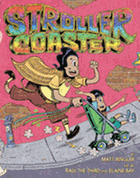
In this vibrant, energetic picture book, Matt Ringler (School Surprise!) imagines one wild ride of a parent-child outing, illustrated by three-time Pura Belpré Award winner Raúl the Third (¡Vamos! Let's Go Eat!) and artistic partner Elaine Bay.
"The inside feels too small for Sam," a brown-skinned little girl with ink-black pigtails. Her dad can cure "this daily disaster" of a nascent tantrum: a ride on the strollercoaster! Sam's plush bunny wipes its forehead in relief as her dad, a rubber-limbed gentleman with a high pompadour, scoops Sam into her stroller. Kelly green with streamer-enhanced handlebar grips and fenders to deflect tendrils of lightning pouring off the wheels, the stroller acts as a dad-powered carnival ride through their bustling neighborhood. "Click clack, click clack, click clack" rattle the wheels, like a wooden coaster rising up a track, as racially diverse neighbors wave to them. In a full-spread close-up, Sam's face radiates elation, her arms spread like wings against a sunset-hued background. In a tunnel, Sam and her dad turn into something akin to scratch art, rainbow sketches against a deep black background. Back at their front door, Sam's dad carries the snoozing Sam inside in the stroller, then settles down with her for a much-deserved nap.
Ringler's zippy, onomatopoeic description of a daily father-daughter ritual lays the track for a breathless thrill ride that perfectly mimics a classic coaster. Bay's peppy palette grabs the eye, and Raúl the Third's visual feast of detail-stuffed scenes and sly sight gags invites readers to linger. Strollercoaster shows that imagination and the bond between caregiver and child can transform a pedestrian routine into a joyful, unforgettable adventure. --Jaclyn Fulwood, youth services manager at Main Branch, Dayton Metro Library

